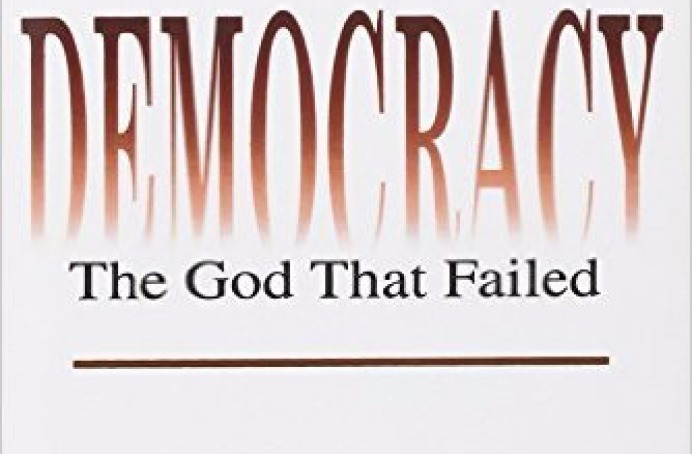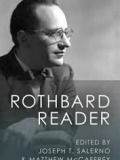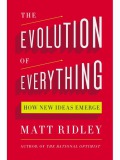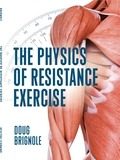
Democracy The God That Failed
The core of this book is a systematic treatment of the historic transformation of the West from monarchy to democracy. Revisionist in nature, it reaches the conclusion that monarchy is a lesser evil than democracy, but outlines deficiencies in both. Its methodology is axiomatic-deductive, allowing the writer to derive economic and sociological theorems, and then apply them to interpret historical events.
A compelling chapter on time preference describes the progress of civilization as lowering time preferences as capital structure is built, and explains how the interaction between people can lower time all around, with interesting parallels to the Ricardian Law of Association. By focusing on this transformation, the author is able to interpret many historical phenomena, such as rising levels of crime, degeneration of standards of conduct and morality, and the growth of the mega-state. In underscoring the deficiencies of both monarchy and democracy, the author demonstrates how these systems are both inferior to a natural order based on private-property.
Hoppe deconstructs the classical liberal belief in the possibility of limited government and calls for an alignment of conservatism and libertarianism as natural allies with common goals. He defends the proper role of the production of defense as undertaken by insurance companies on a free market, and describes the emergence of private law among competing insurers. Having established a natural order as superior on utilitarian grounds, the author goes on to assess the prospects for achieving a natural order. Informed by his analysis of the deficiencies of social democracy, and armed with the social theory of legitimation, he forsees secession as the likely future of the US and Europe, resulting in a multitude of region and city-states. This book complements the author's previous work defending the ethics of private property and natural order. Democracy—The God that Failed will be of interest to scholars and students of history, political economy, and political philosophy.
aboutLiberty Portal

One reason for Rothbard’s continuing popularity is his ability to reach across disciplines, and to connect them: unlike many contemporary economists, who specialize in increasingly narrow fields within the science, Rothbard’s research agenda was expansive and interdisciplinary, covering most of the social sciences and humanities.
Some readers of this book will already be familiar with Rothbard’s major works, such as his path-breaking treatise on economics, Man, Economy, and State. Yet Rothbard also produced hundreds of shorter works for both academic and popular audiences. Unfortunately, many lack the time to explore his writings; what’s more, his oeuvre is so enormous it is often difficult to know where to begin.
This book aims to solve these problems by providing a window into Rothbard’s achievements in the social sciences, humanities, and beyond. It includes introductory, intermediate, and advanced material, to ensure the book can be enjoyed by readers of all levels of understanding and familiarity with Rothbard’s work. Therefore although it is intended primarily for newcomers, veteran readers will also find much to discover or re-discover in these pages.
The individual articles in this collection can be read in any order; with that in mind, we propose two ways to explore them. Those new to Rothbard’s writing may want to begin with the shorter, more accessible chapters that interest them most, before continuing on to more difficult topics. However, we have intentionally arranged the articles and sections so that readers who prefer a systematic discussion, or who are already acquainted with Rothbard’s ideas, can read the book cover to cover.
The volume begins with a personal look at Rothbard’s life and work, as told in his own words. The opening section, “Rothbard: Man, Economist, and Anti-Statist,” brings together three rare interviews, each highlighting different aspects of his unique personality and worldview. Readers will soon recognize an overarching theme running through Rothbard’s life and work: a passion for liberty, a unifying principle in his thought, no matter the discipline.
This commitment can be seen further in the next section, “Foundations of Social Science and the Free Society.” In the first essay, Rothbard stresses “The Discipline of Liberty” as the foundation for the study of humanity. This central interest serves as inspiration and foundation for the project that follows, namely, an outline of the human sciences and their primary method of investigation: praxeology.
Although Rothbard wrote on many subjects, his training—and heart—were in economics, and so too are the majority of the writings in this collection. The next two sections provide a concise exposition of economic theory, beginning with individual value and choice. They explore in turn Rothbard’s insights into the “Principles of Economics and Government Intervention” and “Money, Banking, and the Business Cycle.” Together, these chapters provide a brief overview of Rothbard’s more comprehensive account of economic theory in Man, Economy, and State.
Austrian economists have always been fascinated by the history of their science, and Rothbard was no exception. In fact, his writings on the subject are among his most original and controversial. The section devoted to the “History of Economic Thought” surveys the contributions of many influential economists, outlining the development of economics from mercantilism to the modern Austrian school.
However, Rothbard’s historical interests extended far beyond the history of economic doctrines. The section on “Economic History” illustrates how he consistently a

Human society evolves. Change in technology, language, morality, and society is incremental, inexorable, gradual, and spontaneous. It follows a narrative, going from one stage to the next, and it largely happens by trial and error—a version of natural selection. Much of the human world is the result of human action but not of human design: it emerges from the interactions of millions, not from the plans of a few.
Drawing on fascinating evidence from science, economics, history, politics, and philosophy, Matt Ridley demolishes conventional assumptions that the great events and trends of our day are dictated by those on high. On the contrary, our most important achievements develop from the bottom up. The Industrial Revolution, cell phones, the rise of Asia, and the Internet were never planned; they happened. Languages emerged and evolved by a form of natural selection, as did common law. Torture, racism, slavery, and pedophilia—all once widely regarded as acceptable—are now seen as immoral despite the

